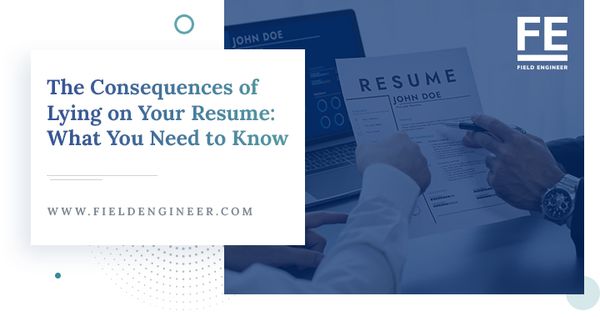The Consequences of Lying on Your Resume: What You Need to Know
Job seekers face intense pressure to stand out in a competitive market. Lying on resumes has become common, but the consequences can be severe, damaging both integrity and reputation. Let's explore why people do it and the potential fallout.
The pressure to stand out and secure a desirable position in today's competitive job market can be overwhelming. But what happens when job seekers resort to unethical tactics, such as lying on their resumes? While it may seem tempting to embellish qualifications or experiences, the consequences of this deceitful act can be severe and long-lasting.
Resume fraud has become a prevalent issue in recent years, with research suggesting that a significant percentage of job applicants have embellished or falsified information on their resumes. This dishonest practice not only undermines the integrity of the hiring process but also puts the individuals involved at risk of damaging their professional reputations.
Lying on a resume is risky and can have serious implications for job seekers and employers. From missed opportunities to legal consequences, the potential fallout from this deceitful act is far-reaching. Individuals must understand the consequences and consider the ethical implications before succumbing to the temptation of resume fraud. In this article, we will delve into why people lie on their resumes and explore the potential consequences they may face.
Why Do People Lie on Their Resumes?
Lying on a resume is a sadly widespread occurrence. A recent survey of over 1,000 U.S. workers found that an alarming 93% know someone who has lied on their resume. It's unclear why people feel compelled to lie in their application materials; however, there are some common topics people lie about regarding resumes. These lies often concern experience, skills, and duties listed; those applying for positions appear to have better chances if they exaggerate certain aspects of themselves or embellish the truthfulness of their qualifications.
People may be tempted to craft a resume that more favorably reflects their abilities or experience level. After all, the job market is competitive, and applying for positions can be tricky as recruiters tend to receive hundreds of applicants for each opening. However, since it is a form of deception, employers can easily detect most cases of fibbing included in a resume during background checks or interviews with potential candidates., In addition, creating an honest presence from the start will build trust between employer and employee, setting you up for greater job satisfaction and long-term commitment down the line should you get hired.
Is It Illegal to Lie on a Resume?
It is important to note that while it may not technically be illegal to lie on a resume, the consequences of doing so can still be dire. If applicants are caught being untruthful on their resumes, they may lose out on job opportunities and even face prosecution for falsifying documents. Furthermore, many employers will require applicants to transfer their information onto an official company job application form, which could lead to legal repercussions if false information is provided on this document.
Employers should also consider the implications of hiring an employee who has lied on their resume. Not only can such behavior potentially damage an organization's reputation but it might also affect the ability of an employee to seek legal recourse against the employer if they deem any action they have taken was legitimately illegal. In this way, employers must take due diligence when reviewing resumes and ensure nothing false has been presented. Ultimately, lying on a resume carries risks and should be avoided to protect oneself from potential consequences.
Lying on a Resume - Where and Why of Misleading Information
When it comes to dishonestly representing oneself on a resume, certain areas are more commonly targeted than others. It is important to be aware of these so that people can spot discrepancies between what is written and what an applicant brings to the table. The most common areas in which lies tend to appear include:
When They Don't Have a Degree
Many job seekers face the challenge of applying to a role and feel as if their lack of a degree is a roadblock. However, it's important to remember that many employers understand that there are different pathways to success and that education is not the only indicator of potential success in a role. Ingledue-Lopez reminds job seekers that “job postings are a ‘wish list' and you don't have to meet every requirement” in order to be considered.
Those who do not possess a degree but still feel qualified for the position should emphasize any relevant skills or experience they may have acquired instead. Work states there are two common approaches: mentioning coursework taken towards a degree or highlighting time spent in related fields with substantial work experience to demonstrate competency for the role. When making your case, framing those experiences in ways that suggest expertise rather than just casually listing them can also help distinguish yourself from other candidates. As long as one also demonstrates qualities such as ambition, drive, and enthusiasm and displays knowledge through interviews, no degree should obstruct your pursuit of opportunity.
When They Don't Have the Right Experience
When it comes to applying for a new job, sometimes you don't have the exact experience that an employer is looking for. This can be disheartening since it can feel like standing on the outside of an opportunity. However, it's important to remember that job descriptions are often wish lists and not hard requirements. That being said, you should never fabricate or falsely state that you have experience when you don't.
In this situation, the best thing to do is to explain in more detail your related skills and how they might apply to the role at hand. For example, if the position requires managing a project but you have yet to actually manage one yourself, then emphasizing your work assisting with a project or how you worked collaboratively within a team to develop or implement timelines shows employers your willingness and ability to learn quickly. Having this kind of open honesty about your experience will help employers view your skill set honestly while still showing why you'd make the perfect addition to their team.
When They Have a Gap in Resume
Having a gap on your resume can cause anxiety. Whether the gap was due to taking time off work for personal reasons or getting laid off, it can be easier to try and stretch the dates to fill in that gap and avoid any awkward conversations. However, lying on a resume is not advisable and could get you into trouble should a background check be performed.
Ingledue-Lopez suggests using the phrase ‘career break’ over those dates instead of lying. Presenting these breaks as opportunities to do something beneficial, such as taking classes, volunteering, or engaging in freelance or contract work, can show any interviewers that you have an advantage over someone without one. Employers will also admire your dedication towards continuing your education and improving yourself while you are not employed elsewhere. Plus, they may even find themselves in a similar situation, so exhibiting traits of determination in making the most out of the break could make you stand out from the competition!
How You'll Get Caught Lying on Your Resume
HR departments use advanced techniques and knowledge to uncover dishonest claims on resumes. From behavioral interviewing, where recruiters are skilled at asking questions tailored to your stated experience to catch lies, to online background checks confirming qualifications and credentials, potential employers have access to more sophisticated tools than ever.
Behavioral interviewing is especially effective for catching falsified resume statements by measuring the depth of the candidate’s understanding of their own work experience. With questions like “Which code did you use for specific projects?” or “What steps were taken to reduce industry impact,” it can quickly become evident whether the applicant is telling the truth or not. Meanwhile, online background checks pick up additional details that cannot easily be discussed in an interview, such as exact dates of employment and educational details, allowing companies to confirm a candidate’s past experience with greater accuracy and reduce their risk when filling job positions.
What Happens When You Lie on Your Resume - Is it Worth The Consequences?
It is never a good idea to lie on your resume. No matter your state, lying on a job application and resume is typically illegal and considered fraud. This can have very real and serious consequences if caught, ranging from being fired to civil or criminal penalties. Not only will lying on your resume damage your reputation with potential employers, but it is also likely not worth the risk of getting caught just to get hired for a position.
By not lying on your resume, you begin on the right foot with your new employer and save yourself from any future mistakes that could lead to longer-lasting career disgrace. Honesty is always the best policy in this scenario, as it builds trust between you and the hiring manager or organization. Furthermore, when crafting your resume, try to avoid exaggerating or fabricating skills you don't possess—employers can easily discover this by conducting background checks during their hiring process. By being honest about one's credentials, experience level, education, and abilities, one can easily avoid these kinds of consequences altogether.
What You Can Do Instead of Lying on Your Resume
While it might be daunting, one of the most important things to stand out in your job application is ensuring your resume is lies-free. Omitting information or exaggerating your skills and experiences can sabotage your chances of landing an interview. Instead of lying on your resume, you should focus on creating a strong application showcasing the best version of yourself.
One way to do this is to craft a strong and impressive cover letter that clearly outlines why you are interested in the position and how you meet the qualifications for the role. Furthermore, it’s important to tailor your resume to fit each job application specifically by making sure that you highlight skills and accomplishments relevant to each position without embellishment. It’s also worth noting any volunteer or mentorship experience as these activities count as valuable career experience, although they may not have been paid positions. Ultimately, try to remember that honesty goes a long way, and showcasing all of your achievements with enthusiasm and confidence will surely give you an advantage when applying for jobs.
What To Do When You've Lied on Your Resume
Once you have discovered that you have lied on your resume, it is important to take steps to fix the issue as soon as possible. The most ideal way to tackle this tricky situation is by making the lie true. If you indicated that you are familiar with certain software, make sure to gain the necessary knowledge to prove that statement. For example, if you stated that you are fluent in a particular foreign language, consider taking some classes or doing additional language training. Doing this demonstrates genuine effort and illustrates your commitment to the job.
Another good way of resolving this problem is being open and honest with your potential employer during the interview stage. Don't attempt to brush it off and pretend that nothing happened. If there were a few inaccuracies regarding dates of employment, job titles, or salary compensation — provide clear elaboration and explain why those errors occurred. This approach could help avoid potential problems down the road and leave a good impression on hiring managers by displaying forthrightness. Being truthful about your mistakes could be viewed positively since it indicates integrity, accountability, and reliability — characteristics employers highly value when considering job applicants.
In conclusion, you must be completely honest in your job application. Lying on it could lead to consequences ranging from being turned away to facing criminal responsibility. That being said, if you feel that there are specific skills or experiences that you do not currently have but think would be beneficial for a job opportunity, consider setting goals and taking action steps towards acquiring those skills or experiences so that they can eventually make an appearance on your resume in the future. This way, you may still appear well-rounded and qualified without resorting to lying. Research shows that 78% of candidates considered misrepresenting themselves or lying when applying for a particular position; hence, it's better to stay honest to avoid any repercussions!









